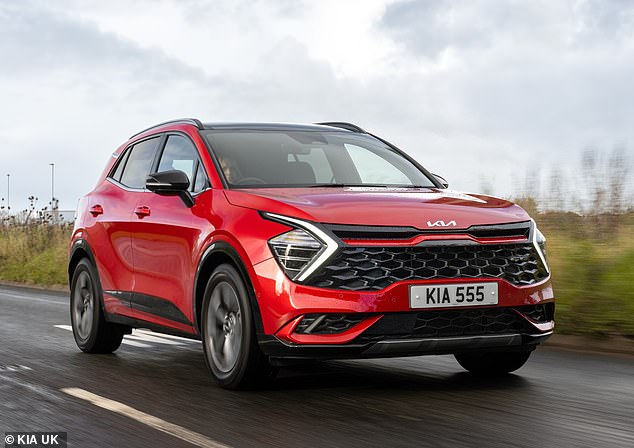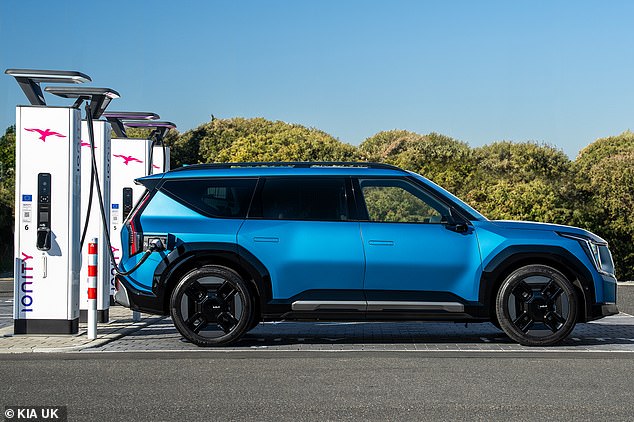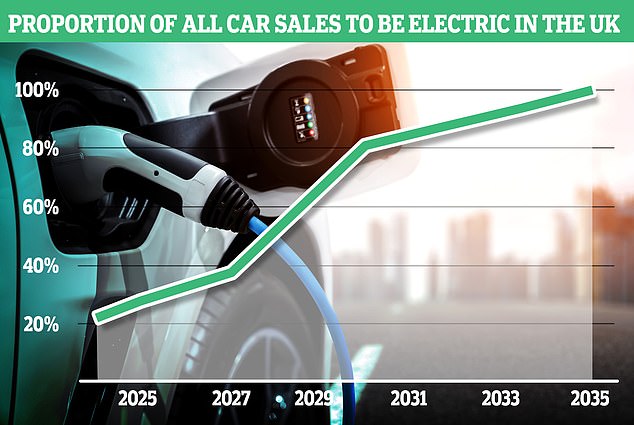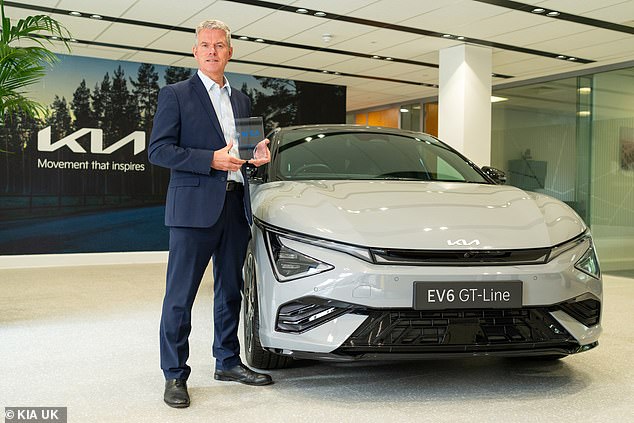A boss at a major car brand has vowed to continue selling petrol and diesel models for ‘as long as we are allowed’ amid claims that the Government is keeping manufacturers in the dark regarding the transition to electric vehicles.
Paul Philpott, president and CEO at Kia UK, said the company would not be ‘abandoning non-EVs any time soon,’ despite the Chancellor’s Autumn Budget clarifying that the ban on sales of new petrol and diesel cars has been accelerated to 2030.
His comments come in the face of the Government’s increasing electric car sales targets putting a huge strain on manufacturers, as well as a lack of clarity regarding the future of hybrids.

Kia UK boss, Paul Philpott, has said the car maker will continue selling petrol and diesel models for ‘as long as we are allowed’ in Britain as he said manufacturers are still waiting on clarity from government regarding the transition to EVs

The Kia Sportage, sold in the UK with petrol or hybrid powertrains, was the best-selling new car in Britain last month – and has a real chance of becoming the most popular in 2024 as a whole
Philpott made the pledge when speaking to PA news agency – and said he had said the same to dealers at a conference in Berlin at the end of May.
It comes in the wake of the company’s Sportage crossover – sold with a choice of petrol, conventional self-charging hybrid and plug-in hybrid drivetrain – topping UK sales charts in October.
With 4,533 registrations last month, the Sportage has put itself in the running to become 2024’s best-selling new car, sitting just 350 units shy of the pace-setting Ford Puma in the full-year rankings with just two months remaining.
Kia is one of the brands that has hedged its bets on fuel types while uncertainty remains around the transition to a zero-emission future.

Kia is one brand that has hedged its bets on the transition to EV. While it currently has five different battery models on sale in the UK (including the EV9 pictured), it has also retained a strong line-up of new petrol and hybrid models

Despite the Chancellor last week confirming that the ban on sales of new petrol and diesel cars has been accelerated to 2030 in a bid to force more drivers to go electric, Philpott, president and CEO at Kia UK, said the company would not be ‘abandoning non-EVs any time soon’
It currently offers five full electric models – EV3, EV6 and EV6 GT, EV9 and Kona Electric – though these sit in showrooms among a wider range of internal combustion engine (ICE) models.
The majority of these cars are sold with petrol or hybrids powertrains, with only its largest SUV – the Sorento – available in Britain with a diesel engine.
And Philpott says there is no urgency within the brand’s decision makers to ditch ICE cars anytime soon, even despite the Government’s still-unclear messaging around when it wants the sale of new petrol and diesel models to be outlawed.
Car makers seeking urgent clarity on EV transition
Last Wednesday, Rachel Reeves confirmed in her Autumn Budget document that the Labour Government had rubberstamped the reintroduction of a 2030 deadline for the ban on sales of new petrol and diesel cars after Rishi Sunak last year decided to push the date back five years to 2035.
Yet the Zero Emission Vehicle (ZEV) Mandate, which sets out binding EV sales targets for mainstream car makers that increase each year between 2024 and 2035, will remain in situ.
This year, Kia and its rivals will need to achieve 22 per cent EV sales in order to avoid punishing fines of up to £15,000 per passenger car below the threshold – a percentage share that will increase annually.

Electric future: The ZEV mandate will force car makers to sell an increasing volume of EVs between now and 2030
The ZEV mandate’s current targets dictate that only 80 per cent of all sales need to be EVs by 2030 – rising to 100 per cent in 2035.
When This is Money contacted the Department for Transport to query the percentage requirements in light of the accelerated ban on sales of ICE cars, it said the remaining 20 per cent non-EV sales share in 2030 would be allocated to hybrid vehicles.
However, it has still not made clear which types of hybrid car will be given the five-year stay of execution into the next decade.
A spokesperson told us: ‘We have always been committed to restoring the original 2030 phase out date for the sale of new cars with pure internal combustion engines.
‘The original phase out date included the provision for some hybrid vehicle sales between 2030-35. We know it is important to provide certainty and stability for drivers and will set out further details in due course.’
And, according to Kia UK’s boss, manufacturers are also yet to be given any certainty on the matter.

Philpott says Kia is waiting on minsters to outline the details of their strategy to outlaw the sales of new petrol and diesel cars, with the future of hybrids still very much up in the air
‘Next year, 28 per cent [of our cars] have to be EV – but that means 72 per cent aren’t EVs, Philpott told PA.
‘So we’ve got to keep the likes of Sportage, Picanto, Stonic and Sorento all going.
‘For as long as we are allowed to sell non-EVs, we’ll go on selling non-EVs.’
He went on: ‘Even 2030 is not clear yet – and we’re asking the government for clarity on what is the 2030/2035 strategy.
‘You’ve got to determine it and tell us because then we can plan for it.
‘All we know is that by 2030, 80 per cent of everything we sell has got to be EVs – but what’s the other 80 per cent? What can they be?
‘We’re making billion-pound decisions about future product stream and future product investment without a clear pathway over the next decade as to what we can sell.’
Some links in this article may be affiliate links. If you click on them we may earn a small commission. That helps us fund This Is Money, and keep it free to use. We do not write articles to promote products. We do not allow any commercial relationship to affect our editorial independence.










